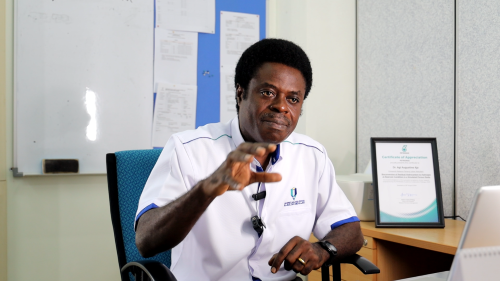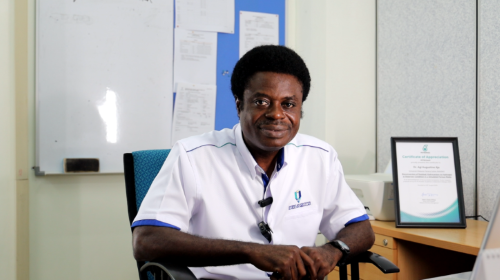UMPSA researcher, Dr. Agi, petroleum engineering expert, aspires to win Nobel Prize
GAMBANG, 10 February 2025 – Dr. Agi Augustine Aja, a senior lecturer at the Faculty of Chemical and Process Engineering Technology (FTKKP), Universiti Malaysia Pahang Al-Sultan Abdullah (UMPSA), has shared his dream of winning the prestigious Nobel Prize at the international level.
Dr. Agi Augustine Aja, who is among the top 2% of scientists worldwide, according to Elsevier and Stanford University, expressed confidence that his dream will come true one day.
“My greatest ambition is to win the Nobel Prize.
“To achieve this, I constantly motivate myself to stay passionate about my research.
“I am always open to exploring new research fields and encourage my students to be bold in trying new things,” said the Nigerian-born researcher.
Currently, Dr. Agi Augustine Aja is working on a study in collaboration with PETRONAS to optimise hydrogen production from non-recoverable oil wells.
“Most oil reservoirs worldwide have reached the final stage of production.
“Enhanced oil recovery (EOR) methods can only recover about 50% of the original oil in place (OOIP).
“As a result, a significant amount of oil remains untapped,” he stated.
He explained that oil producers will continue to abandon these wells in the coming years due to low oil production rates and increasing water cut levels.
“Proper abandonment and decommissioning of oil wells can cost around USD33.58 million.
“These high costs have led oil companies to leave these wells idle and abandoned.
“Additionally, abandoned wells that are not properly sealed are known to release toxic and flammable gases such as methane, which contributes to global warming,” he said.

He further explained that with the growing threat of climate change, many countries around the world are shifting away from fossil fuels towards clean energy generation.
“Therefore, abandoned oil wells can be repurposed for clean energy production.
“Biological methods for hydrogen production require carbon sources and microbes,” he added.
He also mentioned that abandoned and idle oil wells contain large amounts of organic matter in the form of residual oil, which hosts various microorganisms that can be utilised for hydrogen production.
“In situ hydrocarbon conversion to hydrogen is a viable alternative; however, current methods have limitations.
“The main limitation is that in situ combustion methods use heat and oxygen to burn hydrocarbons into hydrogen, but this is mostly applied to heavy oil and requires a lot of energy.
“Moreover, this method consumes excessive hydrocarbons, leading to low yields,” he explained.
The in situ biodegradation method involves using microorganisms to convert hydrocarbons in the reservoir into hydrogen.
However, he noted that not all microorganisms in the reservoir are fermentative microbes, leading to low hydrogen recovery rates.
“Nevertheless, using produced water from reservoirs and external thermophilic bacteria is a promising alternative, but this has not yet been fully investigated.
“Hence, this research aims to bridge this knowledge gap by investigating the role of produced water from oil fields and external thermophilic bacteria in optimising hydrogen production yields,” he explained.
Dr. Agi Augustine Aja began his tenure as a lecturer at UMPSA in July 2022.
He is also a researcher at the Centre for Research in Advanced Fluids & Processes - Fluid Centre (CoE), UMPSA.
He obtained his PhD in Petroleum Engineering from Universiti Teknologi Malaysia (UTM) in 2020.
His areas of expertise include enhanced oil recovery, carbon dioxide sequestration, hydrogen production and storage, carbon capture and storage, drilling fluids, reservoir characterisation, oil well cementing, ultrasonication/ultrafiltration, polymer, and nanoparticle synthesis.
He also highlighted that UMPSA provides an excellent platform with various initiatives and support for young and new researchers like himself to continue growing.
“The seed money allocated to new researchers allows me to build my research team, choose my research direction, and conduct studies independently.
“This is one of UMPSA’s best initiatives, encouraging us as researchers to constantly explore the latest research fields,” he added.
Dr. Agi Augustine Aja is the principal investigator and co-researcher for over eight funded projects in the energy sector.
He has authored over 100 publications in high-impact journals, contributed to two book chapters, and presented at more than 30 conference proceedings.
He is also an editor for Scientific Reports (Springer Nature) Journal, a section editor for the Journal of Chemical Engineering and Industrial Biotechnology, and an active reviewer for over 20 high-impact journals.
Additionally, he is a Chartered Engineer (CEng) registered with the Engineering Council, UK (EC, UK), a Member of the Institution of Engineering and Technology (MIET, IET UK), and a certified Professional Technologist recognised by the Malaysia Board of Technologists (MBOT).
By: By: Naqiah Puaad, Centre for Corporate Communications
Translation by: Dr Rozaimi Abu Samah, UMPSA Press
- 87 views










